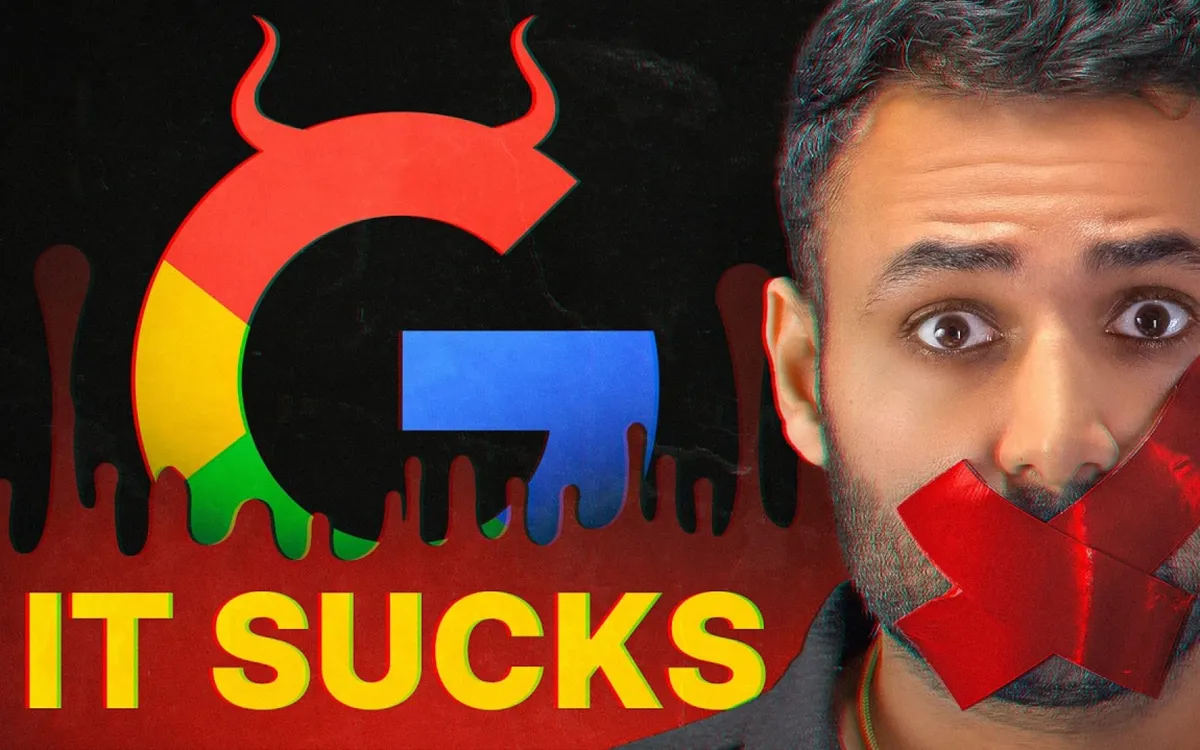
In a scathing critique that has captured widespread attention, popular tech YouTuber Arun Maini, known as Mrwhosetheboss, has released a video titled Why Google Search is Falling Apart. The video, published on October 12, 2024, has amassed nearly 2 million views in just two days, sparking a heated debate about the quality of Google's search results.
Maini, whose channel boasts 19.8 million subscribers, presents a comprehensive analysis of what he perceives as a significant decline in Google's search quality. His 17-minute video meticulously dissects several issues that he argues are degrading the user experience on the world's most popular search engine.
Ad Saturation Takes Center Stage
One of the primary concerns Maini highlights is the overwhelming presence of advertisements in search results. According to the YouTuber, "1, 2, 3, four, four adverts. These are all sponsored links." He likens this to a scenario where a YouTube video would start with four sponsored ads before delivering any content.
Maini introduces the concept of "the fold" in web design, explaining, "The imagined line where if you want to see anything past it, you have to take action like scrolling down." He argues that Google has become complacent, stating, "Google has become so at ease that they don't even feel like they need to convince people to use them anymore."
Blurred Lines Between Ads and Organic Results
The video points out a significant shift in how Google presents sponsored content. "A decade ago, these sponsored links used to be highlighted in yellow, indicating to the user in a very obvious way that these aren't organic search results," Maini explains. He contrasts this with the current design: "Now the sponsored search results look exactly like the genuine search results, apart from a tiny little much less obvious sponsored text."
Shopping Results Raise Eyebrows
When discussing product searches, Maini raises suspicions about Google's practices. "It is really starting to feel like with shopping, Google is specifically making the organic search results bad to make the best way to shop directly from the ads," he asserts. To illustrate his point, Maini demonstrates a search for "thinnest mini fridge," showing how sponsored results match the query perfectly while organic results seem unrelated.
Conflict of Interest Concerns
The video delves into Google's financial structure, highlighting potential conflicts of interest. Maini states, "In Q2 2024, Google made $847 billion in revenue, 76.3% of which came from ads, and about 75% of that ad revenue is specifically from Google search ads alone." He suggests this creates a problematic incentive structure, arguing, "Google doesn't make more money if you find the perfect product. It's not like they're out there hoping you'll have an awesome Google experience and you'll go recommend Google to five friends."
SEO Tactics and Content Quality
Maini also explores how search engine optimization (SEO) tactics have led to a decline in content quality. He notes, "SEO has become a massive industry with a market size valued at 1.8 billion in 2022, projected to reach 7.1 billion in 2028." The video describes various SEO tactics, including keyword stuffing and updating old articles with new dates without adding new information, which Maini argues contribute to lower-quality search results.
Historical Context and Google's Original Vision
To provide context, Maini quotes Google's founders from their original paper: "Advertising income often provides an incentive to provide poor quality search results. We believe the issue of advertising causes enough mixed incentives that it is crucial to have a competitive search engine that is transparent and in the academic realm." This quote, Maini suggests, starkly contrasts with Google's current practices.
As of this report, Google has not officially responded to the criticisms raised in Maini's viral video. However, the rapid spread of the video and the ensuing online discussions indicate that these concerns resonate with a significant portion of Google's user base.
The issues raised by Maini reflect broader ongoing debates about the role of advertising in search engines, the balance between monetization and user experience, and the challenges of maintaining high-quality search results in an era of sophisticated SEO tactics and AI-generated content.
Maini expresses skepticism about Google's concern for these problems. He points out, "I don't see any way that Google wouldn't know that there are companies like this that they are actively promoting and so the only conclusion that I can draw from this is that either Google is completely overwhelmed or Google doesn't care."
He challenges Google directly, stating, "If someone on Google is watching this then correct me if I'm wrong, I would love to be corrected or at the very least promise that you're working to fix this, but it sure looks like right now as long as a company pays, it doesn't actually matter whether they're a scam or not, they go right to the top." This statement underscores Maini's belief that Google's priorities may have shifted away from user experience towards maximizing ad revenue, regardless of content quality or legitimacy.
Key Points
- Arun Maini's video criticizing Google Search has garnered nearly 2 million views in two days.
- Main criticisms include excessive ad saturation, blurred distinctions between ads and organic results, potential manipulation of shopping results, and conflicts of interest due to Google's reliance on ad revenue.
- Maini highlights the growth of the SEO industry and its impact on content quality in search results.
- The video contrasts Google's current practices with its founders' original vision for a transparent, academic-oriented search engine.
- The viral nature of the video suggests these concerns resonate with a large audience, potentially indicating growing dissatisfaction with Google's search experience.

